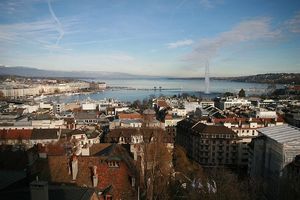Switzerland needs a new Reformation. Only 12% of its Protestant state church members attend even one church service a month. At the same time, there is great emptiness in the lives of most people. Switzerland has the highest suicide rate in the world.
Bible-believing Christians are viewed as cultic and dangerous. Videos from the Swiss-based Christian apologist Francis Schaeffer were taken from a city library and destroyed because they presented ‘a wrong world-view’.
Schoolchildren receive ‘AIDS-education’ and are encouraged to experiment in homosexuality. This year the country voted in favour of legalising abortion.
Darkness
Yet Switzerland is still remembered as the land of the Protestant Reformation. To this day Geneva’s coat of arms bears the text Post tenebras lux (‘After darkness light’). But in school history books there are more pages on Islam than on Christianity!
Does it surprise you to know that a Swiss schoolteacher was sacked for teaching the Ten Commandments? That one church youth group in a village-centre outreach met a teenager who had never heard of Jesus Christ?
That a Swiss congregation can only call a pastor or missionary from another country when the church has at least 100 members?
The state church tolerates same-sex ‘marriages’ and multifaith activities. Evangelicalism is in confusion over ecumenism, the inerrancy of Scripture, Calvinism, and Willow Creek teaching.
All these developments point to the nation being in desperate need of a biblical revival and Reformation. Our only hope is in Jesus Christ, our Lord and Saviour!

Seven signs
In spite of the darkness there are still encouraging signs of hope — welcome rays of light. Here are seven of them.
1. There are still just a few Bible-believing pastors within the cantonal Protestant churches, although it is admittedly very difficult for them to maintain their witness there.
2. The number of Bible-believing independent churches is growing. Some have been started in areas devoid of sound biblical preaching for many years — often by Christians who left their denominational churches because of liberal and ecumenical teaching.
3. In 1970 an interdenominational theological seminary was established in Basel, called the Independent Theological Seminary of Basel. This has obtained the state’s permission to train pastors to university level.
Its faculty and students believe in the inerrancy of Scripture. Since it was founded 32 years ago, it has graduated more than 400 students who are ministering all over the world.
There are also other Bible Colleges that hold to the full authority of the Scriptures.
Freedom
4. There is religious freedom, and opportunities to reach out with the gospel.
For many years the Swiss branch of Child Evangelism Fellowship (CEF) has arranged an evangelistic holiday programme for children mainly from a non-Christian background.
This summer, 65 children attended morning and afternoon CEF programmes on a camping site, and some parents came to listen to the gospel.
5. In the political arena, the EDU, or ‘Confederated Democratic Union’, has obtained one seat in the Swiss Parliament (along with a predominately Roman Catholic ‘Christian People’s Party’ and a liberal ‘Evangelical People’s Party’).

The EDU is a party formed to represent Bible-believing Protestants. It aims, among other things, to maintain Christian ethics within Swiss society.
Switzerland’s democratic structures means that even a small party like the EDU can have a significant influence, especially during the frequent public referendums.
Light
6. Some of Switzerland’s large immigrant populations have formed their own churches.
In severa cities, quite large English-speaking congregations have been established — including one in Lausanne, formerly pastored by Stuart Olyott.
In Zurich, there is a Reformed Korean church that has taken The Second Helvetic Confession as its standard. The Swiss Reformer Johann Bullinger played an important part in writing the Helvetic Confessions.
This is particularly significant, since all Switzerland’s Reformed state churches gave up their confessions before the end of the nineteenth century! The German version of The Second Helvetic Confession has been out of print for some years.
7. In Autumn 2000 some Swiss Christians united to form an association of Biblical Reformed Protestantism in order to keep the Reformation heritage alive.
Part of the association’s ministry is exercised through a small publishing house called Onesimus Verlag (www.onesimus.ch), which has adopted the statement of faith of the Evangelical Theological College of Wales.
All these signs are shafts of light that give hope of better days to come. They will surely encourage all faithful Christians. Your prayers are very much appreciated!
Based on information supplied by
Reinhard Möller




